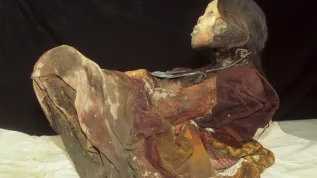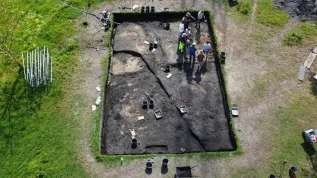
Wall paintings from Old Dongola in Sudan, discovered by Polish archaeologists, have a chance to win the International Archaeological Discovery Award 'Khaled al-Asaad'. Internet users can also choose their winner. The online voting will continue until October 1.
The winners of the main prize, selected from among the five candidate discoveries, will be announced on November 1 during the 26th edition of the Mediterranean Exchange of Archaeological Tourism.
In addition to the paintings from Old Dongola, the nominees are: a lost city from the Bronze Age in China's Shaanxi province; a 5,000-year-old 'taberna' from ancient Mesopotamia; the Theatre of Nero in Rome; remains of a Roman mausoleum in London's Southwark district.
A complex of rooms in Old Dongola in Sudan, the interior of which is covered with unique scenes in Christian painting, was discovered by archaeologists as part of a project led by Dr. Artur Obłuski from the Polish Centre of Mediterranean Archaeology, University of Warsaw. The paintings sparked great interest in the media and the scientific community, also due to iconographic motifs previously unknown in Christian art.
Old Dongola (Old Nubian Tungul) was the capital of Makuria, one of the most prominent states of medieval Africa. Research in this city was initiated by Professor Kazimierz Michałowski. It is currently carried out under the European Research Council (ERC) Starting Grant: 'UMMA - Urban Metamorphosis of the community of a Medieval African capital city'.
In the spring of 2023, the Polish Centre of Mediterranean Archaeology, University of Warsaw reported that archaeologists Dr. Lorenzo de Lellis and Dr. Maciej Wyżgoł unexpectedly stumbled upon a complex of rooms made of sun-dried brick, the interiors of which were covered with figural scenes unique for Christian art. The discovery was made during the exploration of houses dating from the Funj period (16th-19th century CE). Beneath the floor of one of the houses was an opening leading to a small chamber, the walls of which were decorated with unique representations.
The competition is organized by the Mediterranean Exchange of Archaeological Tourism in cooperation with the Italian archaeological journal Archeo.
The award was established in 2015. It is named after the pioneer of Syrian archaeology Khaled al-Asaad, who had been involved for over 50 years in excavations and conservation of monuments in the ancient Syrian city of Palmyra.
He died in 2015, murdered by the Islamic State, while protecting the cultural heritage of that place.
You can read about all the discoveries on the competition website and on Facebook. You can vote by 'liking' the selected discovery on the profile above.
PAP - Science in Poland
ekr/ agt/ kap/
tr. RL













